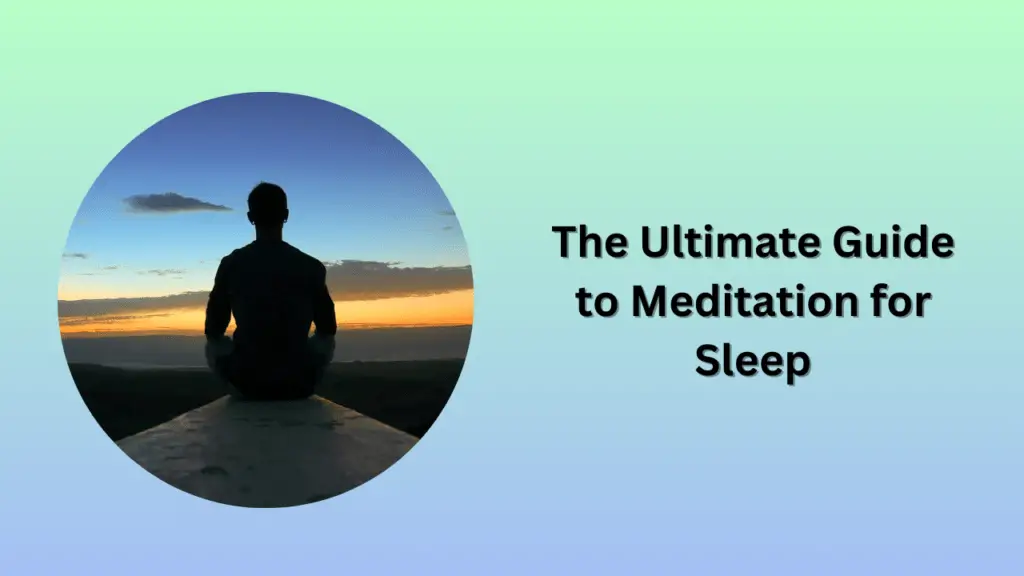Table of Contents
ToggleIntroduction
Many people find it difficult to get a good night’s sleep in this fast-paced world. Insomnia, stress, and endless thoughts can plague our minds as we toss and turn in bed, desperately seeking a peaceful slumber. This is where meditation comes in as a powerful tool to calm the mind, relax the body, and promote sleep. If you’re someone who struggles with sleep issues, this ultimate guide to meditation for sleep is here to help you embark on a journey towards better rest.
Understanding the Importance of Sleep
The quality of our sleep is crucial for our overall health and well-being. It is during sleep that our bodies repair and rejuvenate, helping us to function at our best during waking hours. Lack of quality sleep can lead to a range of health issues, including increased stress levels, decreased cognitive function, and even a weakened immune system. It is essential to prioritize sleep and create a bedtime routine that supports restful and rejuvenating sleep.
LUNA Sleep Supplement is an herbal sleep supplement manufactured with safe, natural, and scientifically supported ingredients that promote a healthy, balanced sleep schedule.
- LUNA uses safe and natural ingredients for better sleep.
- It is backed by research for effective results.
- Promotes a healthy sleep routine.
- No risk of dependency or addiction.
- Users report improved sleep quality.
How Meditation Can Help Improve Sleep

Calming the Mind and Body
Meditation is a technique that aims to concentrate the mind and eliminate any distracting thoughts. By engaging in meditation before bedtime, you can calm your mind and reduce the mental chatter that often keeps you awake at night. Meditation techniques such as deep breathing, body scans, and visualization can help relax the body and promote a sense of peace and tranquility, making it easier to drift off to sleep.
Managing Stress and Anxiety
Stress and anxiety are the leading causes of sleep disturbances. It can be challenging to relax and fall asleep due to constant worrying and racing thoughts. Meditation is a powerful tool for managing stress and anxiety, as it helps to quiet the mind and cultivate a sense of inner calm. By practicing meditation regularly, you can reduce stress levels, lower cortisol levels, and create a more peaceful state of mind that is conducive to sleep.
Improving Sleep Quality
Regular meditation has been shown to improve the quality of sleep by promoting relaxation and reducing physiological arousal. Studies have found that individuals who meditate before bed experience deeper, more restorative sleep cycles, resulting in increased feelings of refreshment and alertness upon waking. By incorporating meditation into your nightly routine, you can enhance the quality of your sleep and wake up feeling more energized and rejuvenated.
Establishing a Meditation Routine for Better Sleep

Creating a Relaxing Environment
Setting the stage for a peaceful night’s sleep begins with creating a relaxing environment for meditation. Choose a quiet, comfortable space free from distractions, and dim the lights to create a calming ambiance. You may also consider incorporating soothing elements such as candles, essential oils, or soft music to enhance the relaxation experience.
Setting Aside Dedicated Time
To reap the benefits of meditation for sleep, consistency is crucial. Set aside a dedicated time each night to practice meditation, ideally around 15-20 minutes before bedtime. By establishing a regular meditation routine, you signal to your body and mind that it is time to unwind and prepare for rest, making it easier to ease into sleep when the time comes.
Exploring Different Meditation Techniques

To find the meditation technique that works best for you, there are several techniques that you can explore. Some popular options for promoting sleep include:
- Mindfulness Meditation: Focus on your breath and bring your attention to the present moment, letting go of thoughts and distractions.
- Body Scan: Progressively relax each part of your body from head to toe, releasing tension and promoting physical relaxation.
- Guided Visualization: Imagine a peaceful scene or scenario that brings you comfort and tranquility, guiding your mind to a state of relaxation.
Experiment with different techniques to see which ones resonate with you and have the most significant impact on your sleep quality.
Overcoming Common Challenges in Meditation for Sleep

Dealing with Racing Thoughts
It is normal to experience racing thoughts or mental chatter when you first begin meditating. If you find yourself struggling to quiet your mind, try acknowledging the thoughts without judgment and gently redirecting your focus back to your breath or chosen meditation technique. With practice, you will learn to observe your thoughts without getting caught up in them, allowing for a more peaceful and focused meditation experience.
Restlessness and Physical Discomfort
Physical discomfort or restlessness can also be common obstacles in meditation for sleep. If you find it challenging to sit still or experience discomfort in your body, consider adjusting your posture or trying a lying-down meditation practice. You can also incorporate gentle stretches or yoga poses to release tension and prepare your body for relaxation.
Consistency and Patience
Building a meditation practice takes time and patience, especially when it comes to using meditation to improve sleep. It is essential to approach meditation with an open mind and a willingness to embrace the process, even if the results are not immediate. Consistent practice and patience are key to experiencing the full benefits of meditation for sleep, so stick with it even on nights when sleep seems elusive.
“A long journey starts with taking just one step.” – Lao Tzu
Incorporating Meditation into Your Bedtime Routine

Creating a Wind-Down Ritual
Incorporating meditation into your bedtime routine can signal to your body that it is time to unwind and prepare for sleep. Consider creating a wind-down ritual that includes meditation as well as other calming activities such as gentle stretching, reading, or taking a warm bath. By establishing a consistent bedtime routine, you can train your body to relax and transition seamlessly into restful sleep.
Practicing Gratitude and Reflection
A gratitude practice can be a powerful addition to your bedtime meditation routine. Take a few moments each night to reflect on the positive aspects of your day and express gratitude for the blessings in your life. Cultivating a mindset of gratitude can help shift your focus from worry and anxiety to appreciation and contentment, creating a more peaceful and positive state of mind conducive to restful sleep.
Disconnecting from Screens
In today’s digital age, screens are ubiquitous and can disrupt our sleep patterns by emitting blue light that interferes with melatonin production. To enhance the effectiveness of your bedtime meditation routine, consider disconnecting from screens at least an hour before bedtime. Instead, engage in relaxing activities that promote calmness and prepare your mind and body for sleep.
Conclusion
Incorporating meditation into your bedtime routine is a powerful way to promote restful sleep and enhance your overall well-being. By calming the mind, managing stress, and improving sleep quality, meditation can be a transformative tool for individuals struggling with sleep issues. Remember to create a relaxing environment, set aside dedicated time for meditation, explore different techniques, and be patient with yourself as you embark on this journey towards better sleep. With consistency and perseverance, you can experience the profound benefits of meditation for sleep and wake up feeling refreshed, rejuvenated, and ready to tackle the day ahead. Start your meditation practice tonight and take the first step towards a good night’s sleep.


